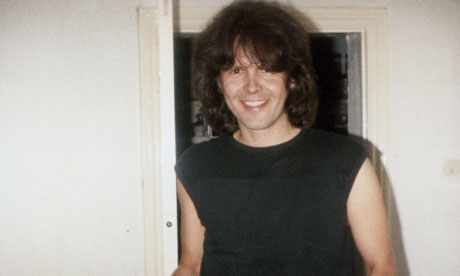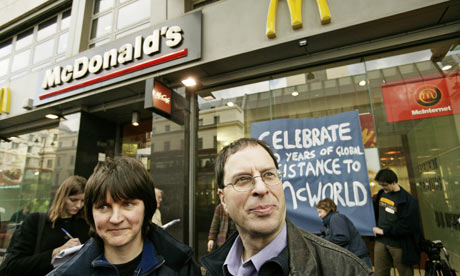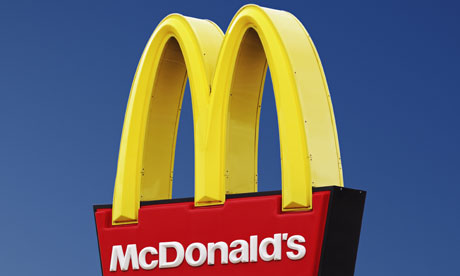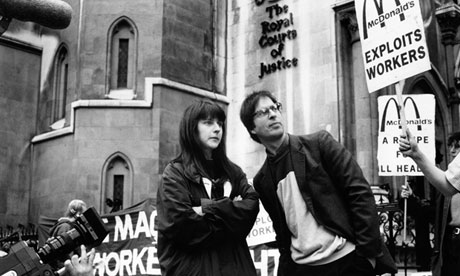We should not fear some Orwellian future state where we're subjected to total electronic scrutiny – it's our present reality

Bob Lambert, an undercover policeman who is alleged to have lied in court and has been accused by an MP of firebombing, was awarded an MBE in 2008 and now teaches at St Andrews University. Photograph: guardian.co.uk
'If you are a law-abiding citizen of this country, going about your business and your personal life, you have nothing to fear." That's how William Hague, the foreign secretary, responded to the revelations of mass surveillance in the US and the UK. Try telling that to Stephen Lawrence's family.
Four police officers were deployed to spy on the family and friends of the black teenager murdered by white racists. The Lawrences and the people who supported their fight for justice were law-abiding citizens going about their business. Yet undercover police were used, one of the spies now tells us, to hunt for "disinformation" and "dirt". Their purpose? "We were trying to stop the campaign in its tracks."
The two unfolding spy stories resonate powerfully with each other. One, gathered by Paul Lewis and Rob Evans, shows how police surveillance has been comprehensively perverted. Instead of defending citizens and the public realm, it has been used to protect the police from democratic scrutiny and stifle attempts to engage in politics.
The other, arising from the documents exposed by Edward Snowden, shows that the US and the UK have been involved in the mass interception of our phone calls and use of the internet. William Hague insists that we should "have confidence in the work of our intelligence agencies, and in their adherence to the law and democratic values". Why?
Here are a few of the things we have learned about undercover policing in Britain. A unit led by a policeman called Bob Lambert deployed officers to spy on peaceful activists. They adopted the identities of dead children and then infiltrated protest groups. Nine of the 11 known spies formed long-term relationships with women in the groups, in some cases (including Lambert's) fathering children with them. Then they made excuses and vanished.
They left a trail of ruined lives, fatherless children and women whose confidence and trust have been wrecked beyond repair. They have also walked away from other kinds of mayhem. On Friday we discovered that Lambert co-wrote the leaflet for which two penniless activists spent three years in the high court defending a libel action brought by McDonald's. The police never saw fit to inform the court that one of their own had been one of the authors.
Bob Lambert has been accused of using a false identity during a criminal trial. And, using parliamentary privilege, the MP Caroline Lucas alleged that he planted an incendiary device in a branch of Debenhams while acting as an agent provocateur. The device exploded, causing £300,000 of damage. Lambert denies the allegation.
Police and prosecutors also failed to disclose, during two trials of climate-change activists, that an undercover cop called Mark Kennedy had secretly taped their meetings, and that his recordings exonerated the protesters. Twenty people were falsely convicted. Those convictions were later overturned.
If the state is prepared to abuse its powers and instruments so widely and gravely in cases such as this, where there is a high risk of detection, and if it is prepared to intrude so far into people's lives that its officers live with activists and father their children, what is it not prepared to do while spying undetectably on our private correspondence?
Already we know that electronic surveillance has been used in this country for purposes other than the perennial justifications of catching terrorists, foiling foreign spies and preventing military attacks. It was deployed, for example, to spy on countries attending the G20 meeting the UK hosted in 2009. If the government does this to other states, which might have the capacity to detect its spying and which certainly have the means to object to it, what is it doing to defenceless citizens?
It looks as if William Hague may have misled parliament a fortnight ago. He claimed that "to intercept the content of any individual's communications in the UK requires a warrant signed personally by me, the home secretary, or by another secretary of state".
We now discover that these ministers can also issue general certificates, renewed every six months, which permit mass interception of the kind that GCHQ has been conducting. Among the certificates issued to GCHQ is a "global" one authorising all its operations, including the trawling of up to 600m phone calls and 39m gigabytes of electronic information a day. A million ministers, signing all day, couldn't keep up with that.
The best test of the good faith of an institution is the way it deals with past abuses. Despite two years of revelations about abusive police spying, the British government has yet to launch a full public inquiry. Bob Lambert, who ran the team, fathered a child by an innocent activist he deceived, co-wrote the McDonald's leaflet, is alleged to have lied in court and has been accused by an MP of firebombing, was awarded an MBE in 2008. He now teaches at St Andrews University, where he claims to have a background in "counter-terrorism".
The home office minister Nick Herbert has stated in parliament that it's acceptable for police officers to have sex with activists, for the sake of their "plausibility". Does this sound to you like a state in which we should invest our trust?
Talking to Sunday's Observer, a senior intelligence source expressed his or her concerns about mass surveillance. "If there was the wrong political change, it could be very dangerous. All you need is to have the wrong government in place." But it seems to me that any government prepared to subject its citizens to mass surveillance is by definition the wrong one. No one can be trusted with powers as wide and inscrutable as these.
In various forms – Conservative, New Labour, the coalition – we have had the wrong government for 30 years. Across that period its undemocratic powers have been consolidated. It has begun to form an elective dictatorship, in which the three major parties are united in their desire to create a security state; to wage unprovoked wars; to defend corporate power against democracy; to act as a doormat for the United States; to fight political dissent all the way to the bedroom and the birthing pool. There's no need to wait for the "wrong" state to arise to conclude that mass surveillance endangers liberty, pluralism and democracy. We're there already





